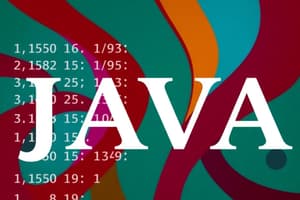Podcast
Questions and Answers
Which statement about variables in Java is correct?
Which statement about variables in Java is correct?
- Variables are created when they are first declared in Java. (correct)
- Variables are stored at a fixed memory location in Java.
- Variable names in Java can't contain numbers or underscores.
- Variable names in Java can start with special characters.
What is the correct naming convention for variables in Java?
What is the correct naming convention for variables in Java?
- Start with a special character followed by any character.
- Start with a letter followed by letters, digits, or underscores. (correct)
- Start with a digit followed by any character.
- Start with an underscore followed by any character.
Which of the following is NOT a valid data type in Java?
Which of the following is NOT a valid data type in Java?
- byte
- real (correct)
- char
- double
What type of operators are used in Java to perform logical comparisons?
What type of operators are used in Java to perform logical comparisons?
If you need to store whole numbers without decimal points in Java, which data type would you use?
If you need to store whole numbers without decimal points in Java, which data type would you use?
Which statement about variable initialization is correct in Java?
Which statement about variable initialization is correct in Java?
What does the modulus operator (%) do in Java?
What does the modulus operator (%) do in Java?
Which control structure in Java is used for making decisions based on conditions?
Which control structure in Java is used for making decisions based on conditions?
What is the purpose of methods in Java?
What is the purpose of methods in Java?
Which arithmetic operator has the highest precedence in Java?
Which arithmetic operator has the highest precedence in Java?
What is the purpose of the calculateArea method in Java?
What is the purpose of the calculateArea method in Java?
Which keyword indicates the visibility of a method in Java?
Which keyword indicates the visibility of a method in Java?
Flashcards are hidden until you start studying
Study Notes
Core Java Fundamentals
Variables
Variables serve as containers for storing values within a program. They come into existence when they're first assigned a value. The Java programming language uses a dynamic storage mechanism, so variables are stored wherever they are declared. Most modern languages allow variable names to start with letters, numbers, or underscores, though in Java, variable names must begin with a letter followed by any number of letters, digits, or underscores. For example:
int num = 2; // Integer variable named 'num' initialized with the value 2
String name = "John"; // String variable named 'name' initialized with the string "John"
Data Types
Data types define the characteristics and operations that can be performed on variables. These include integer types like byte, short, int, and long; floating-point types such as float and double; boolean type boolean; character type char; and object-oriented types including classes and arrays. The choice of data type depends largely on the intended purpose of the variable. For instance, using an int instead of a long would be appropriate if you know the values will never exceed its maximum.
Operators
Operators in Java perform mathematical calculations or logical comparisons on variables or literal values. Some common arithmetic operators are addition (+), subtraction (-), multiplication (*), division (/), and modulus (%):
int result = 5 + 7 * 3 / 2 % 4;
System.out.println(result);
Control Flow
Control flow refers to the sequence of statements executed by a computer. It can be altered during runtime based on certain conditions. Popular control structures in Java include if-else blocks, switch cases, loops (e.g., for, while, do-while) and jump statements (e.g., break, continue).
Methods
Methods are reusable pieces of code that perform a specific task within a class. They are declared within the class and can take parameters, return values, or both. A method declaration begins with a keyword (public, private, etc.), followed by its return type, the name of the method, parentheses containing any formal parameters, and a semicolon. The body of the method is enclosed in curly braces:
public double calculateArea(int sideLength) {
return 2 * Math.PI * sideLength;
}
In conclusion, Core Java covers fundamental concepts such as variables, data types, operators, control flow, and methods, which are crucial for understanding and building programs using this popular programming language.
Studying That Suits You
Use AI to generate personalized quizzes and flashcards to suit your learning preferences.




